| |||||
| Decades: | |||||
|---|---|---|---|---|---|
| See also: | |||||
Events in the year 2024 in Croatia .
| |||||
| Decades: | |||||
|---|---|---|---|---|---|
| See also: | |||||
Events in the year 2024 in Croatia .
Source: [9]
The politics of Croatia are defined by a parliamentary, representative democratic republic framework, where the Prime Minister of Croatia is the head of government in a multi-party system. Executive power is exercised by the Government and the President of Croatia. Legislative power is vested in the Croatian Parliament. The Judiciary is independent of the executive and the legislature. The parliament adopted the current Constitution of Croatia on 22 December 1990 and decided to declare independence from Yugoslavia on 25 May 1991. The Constitutional Decision on the Sovereignty and Independence of the Republic of Croatia came into effect on 8 October 1991. The constitution has since been amended several times. The first modern parties in the country developed in the middle of the 19th century, and their agenda and appeal changed, reflecting major social changes, such as the breakup of Austria-Hungary, the Kingdom of Serbs, Croats and Slovenes, dictatorship and social upheavals in the kingdom, World War II, the establishment of Communist rule and the breakup of the SFR Yugoslavia.

The prime minister of Croatia, officially the president of the government of the Republic of Croatia, is Croatia's head of government, and is de facto the most powerful and influential state officeholder in the Croatian system of government. Following the first-time establishment of the office in 1945, the 1990–2000 semi-presidential period is the only exception where the president of Croatia held de facto executive authority. In the formal Croatian order of precedence, however, the position of prime minister is the third highest state office, after the president of the Republic and the speaker of the Parliament.

The Independent Democratic Serb Party is a social-democratic political party in Croatia representing the interests of the Croatian Serbs. It holds, progressive, pro-European stances and is generally considered a centre-left party.

The Croatian Democratic Union is a major conservative, centre-right political party in Croatia. Since 2016, it has been the ruling political party in Croatia under the incumbent Prime Minister Andrej Plenković. It is one of the two major contemporary political parties in Croatia, along with the centre-left Social Democratic Party (SDP). It is currently the largest party in the Sabor with 62 seats. The HDZ governed Croatia from 1990 before the country gained independence from Yugoslavia until 2000 and, in coalition with junior partners, from 2003 to 2011, and since 2016.

Josip "Joža" Manolić was a Croatian politician and communist revolutionary during World War II in Yugoslavia. He served as a high-ranking official of the Yugoslav State Security Administration and later as Prime Minister of Croatia, from 24 August 1990 to 17 July 1991. He was the last prime minister of Croatia as a constituent republic of Yugoslavia, as the country formally declared its independence during his term, on 25 June 1991. Following his brief term as prime minister, Manolić served as the first Speaker of the Chamber of Counties, the then upper house of the Croatian Parliament, from 1993 until 1994.

The Croatian World Games are an Olympics-style amateur multi-sport competition pitting autochthonous Croat communities in Croatia and neighbouring nations against each other and Croatian diaspora communities, representing countries they live in. The event is organized by the Croatian Olympic Committee and the Croatian World Congress. It is also known under the unofficial name Crolympics, with the motto "Olympic games with Croatian sign".

Gordan Jandroković is a Croatian diplomat and politician serving as Speaker of the Croatian Parliament since 2017. He previously served as Minister of Foreign Affairs and European Integration from 2008 to 2011, and as Deputy Prime Minister from 2010 to 2011 in the cabinets of prime ministers Ivo Sanader and Jadranka Kosor.
The ministry of Economy and Sustainable Development of the Republic of Croatia is the ministry in the Government of Croatia which is in charge of the development of the economy, and conducting administrative and other tasks related to:

Tomislav Karamarko is a Croatian politician who served as First Deputy Prime Minister of Croatia from January to June 2016. He served in the Cabinet of Jadranka Kosor as Minister of the Interior from 2008 to 2011.
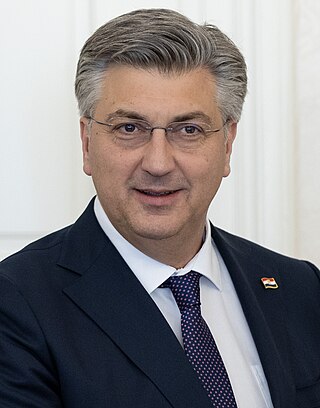
Andrej Plenković is a Croatian politician who has been serving as the prime minister of Croatia since 19 October 2016. He was previously one of eleven Croatian members of the European Parliament, serving from Croatia's accession to the European Union in 2013 until his resignation as MEP when he took office as prime minister. Plenković has also been serving as the president of the Croatian Democratic Union since 2016.
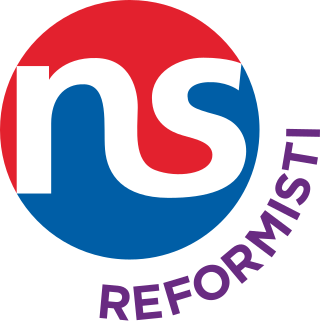
People's Party – Reformists is a liberal political party in Croatia.
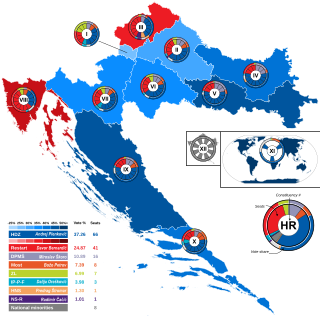
Parliamentary elections were held in Croatia on 5 July 2020. They were the tenth parliamentary elections since the first multi-party elections in 1990 and elected the 151 members of the Croatian Parliament. 140 Members of Parliament were elected from geographical electoral districts in Croatia, three MPs were chosen by the Croatian diaspora and eight MPs came from the ranks of citizens registered as belonging to any of the 22 constitutionally recognized national minorities.
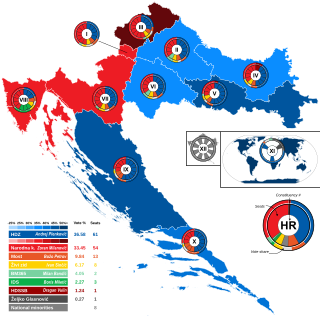
Parliamentary elections were held in Croatia on 11 September 2016, with all 151 seats in the Croatian Parliament up for election. The elections were preceded by a successful motion of no confidence against Prime Minister Tihomir Orešković and his cabinet on 16 June 2016, with 125 MPs voting in favour of the proposal. A subsequent attempt by the Patriotic Coalition to form a new parliamentary majority, with Minister of Finance Zdravko Marić as Prime Minister, failed and the Parliament voted to dissolve itself on 20 June 2016. The dissolution took effect on 15 July 2016, which made it possible for President Kolinda Grabar-Kitarović to officially call for elections on 11 September 2016. These were the ninth parliamentary elections since the 1990 multi-party elections.
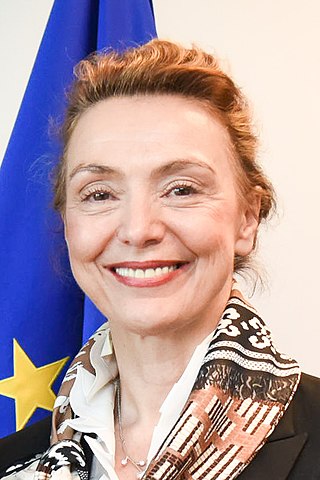
Marija Pejčinović Burić is a Croatian politician of the centre-right Croatian Democratic Union party who served as Minister of Foreign and European Affairs and First Deputy Prime Minister of Croatia from 2017 to 2019. She was the third woman to hold the post of foreign minister, following Kolinda Grabar-Kitarović and Vesna Pusić. Pejčinović Burić previously served as a Member of Parliament during its Sixth Assembly (2008–2011), representing the 6th electoral district.
This article lists events from the year 2019 in Croatia.
Vesna Bedeković is a Croatian pedagog and politician who served as the Minister of Demographics, Family, Youth and Social Policy from July 2019 to July 2020 in the cabinet of Andrej Plenković.
Karlo Ressler is a Croatian politician who has been serving as a Member of the European Parliament since 2019.
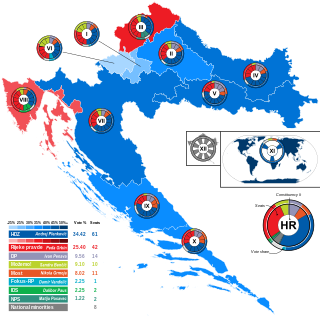
Parliamentary elections were held in Croatia on 17 April 2024 to elect the members of the 11th Sabor. Prior to the elections, the government consisted of a coalition of the Croatian Democratic Union and Independent Democratic Serb Party, with parliamentary support of five national minority MPs, two MPs from the Croatian Social Liberal Party and Croatian Demochristian Party, and one independent MP, Silvano Hrelja.
Events in the year 2021 in Croatia.